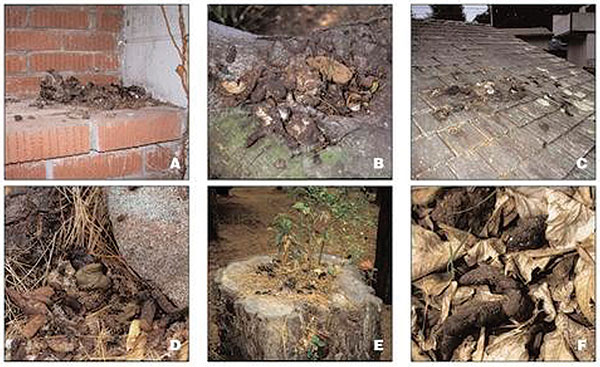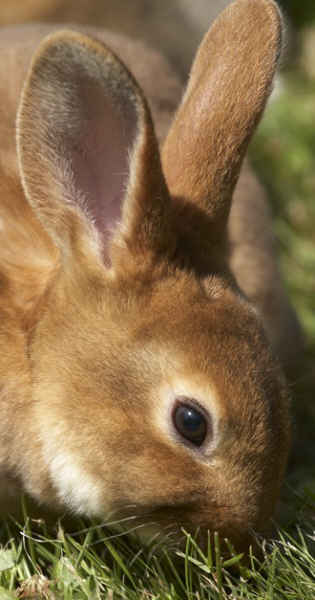| Back to Back Issues Page |
 |
|
Rabbit Rhythm #031 - Raccoon Roundworm Alert, pest rabbits and more September 25, 2012 |
Rabbit Rhythms of OctoberSummer has completely faded into fall. Rabbits' body clocks are telling them it is time to rest and recuperate from a spring and summer of hectic breeding and bearing. Interestingly, it is also the only season that bucks might cohabitate peaceably. Their own hormones are at their lowest ebb. October is when we hear from rabbit breeders who suddenly have a herd of stubborn does that refuse to breed. If you have not already augmented the lighting in the rabbitry, it may very well be that your rabbits have entered their dormant rest-and-rebuilding phase. Nevertheless, it is possible to avert or to overcome the unwillingness to breed:
Healthy RabbitsRaccoon Roundworm AlertWe’ve discovered a significant threat to the health of animals and children that is now endemic in raccoon populations - the raccoon roundworm, Baylisascaris procyonis.As the nutritive value of local natural vegetation drops into the basement during the fall months, we are once again targets of the local raccoons that live in the woods behind our office. They’re looking for free handouts, and they're probably prowling around your premises as well.
Rabbits can also become intermediate hosts to raccoon roundworms, though we don’t believe that the risk of human infection is as great from a living or a dead rabbit as it is from direct contact with raccoons or their latrines. But:
If so, you may wish to know whether or not raccoon roundworm larvae migrations are causing the symptoms. Note that your vet won’t look for eggs in the stool; he’ll look for symptoms of larval cysts or migrations within the tissues, eyes and brain of the rabbit, or check the blood for antibodies against the raccoon roundworm. If your rabbits come down with a raccoon roundworm infestation, be very wary for the presence of raccoons or their latrines on your property, for your sake and that of your very young children! Learn about Raccoon Roundworms here Overheard at Raising-Rabbits.comKatrina in Oklahoma said: "I started raising rabbits a year ago and I love keeping rabbits. It has a healing and comforting effect. Thank you for this informing and inspiring site."Thank you for your kind words! www.Raising-Rabbits.com is here as a resource for rabbit breeders and pet rabbit owners.  Rabbits in the NewsPolyculture and Pesky RabbitsThe Drought of 2012: An Organic Farmer’s PerspectiveFor those raising your own rabbit forages or garden produce for your family, here is an intriguing story for two reasons:
A polyculture approach to agriculture is healthy for the planet. It entails raising animals and their forages in such a way as will enrich the land and the soil. In a polyculture farm, it soon becomes self-evident that farm animals and their fertilizing manure are essential to human health and to the health of our planet. Joel Salatin of Polyface Farms provides an excellent example of a healthy farm. "I am a caretaker of creation," he says in the following YouTube preview of Fresh, the movie, "I don’t own it. What I’m supposed to do is leave it to the next generation in better shape than I found it." Exactly!
Rabbits make an excellent addition to the concept of polyculture! Not all of us have opportunity to actually till the fields or herd the cattle or chickens. But the vast majority of us may have a farmer’s market not too far from us supplied by those very farmers or hobby farmers that grow the food and animals in harmony with nature in a way that enriches the earth rather than depletes it.
According to Sandy’s Garden (quoting from The Gardener’s Dictionary), "‘Garden’ is defined as, "One of a vast number of free, outdoor restaurants operated by charity-minded amateurs in an effort to provide healthful, balanced meals for insects, birds and animals." But rather than reach for the trusty twelve-bore, there are other ways of coping with the local rabbit population..." The article is a cheerful read.
Like this newsletter?Maybe your friends would too...
Your friends at Raising-Rabbits.com wish you a wonderful October. Enjoy your rabbits!
|
| Back to Back Issues Page |
 The discovery of piles of raccoon dung, also called raccoon latrines, should be treated as a RED ALERT, as they will be contaminated with sticky raccoon roundworm eggs, many of them infective. Your
toddler may not know better than to toddle through the dung. If he or she trips and lands hands first, and then places his hands in his mouth, the chance of ingesting an unknown quantity of sticky raccoon roundworm eggs cannot be minimized. It is truly frightening the medical disaster that a
The discovery of piles of raccoon dung, also called raccoon latrines, should be treated as a RED ALERT, as they will be contaminated with sticky raccoon roundworm eggs, many of them infective. Your
toddler may not know better than to toddle through the dung. If he or she trips and lands hands first, and then places his hands in his mouth, the chance of ingesting an unknown quantity of sticky raccoon roundworm eggs cannot be minimized. It is truly frightening the medical disaster that a  It'd be really nice if there were a little something left over for you and your rabbits once the wild critters got through with your garden!
It'd be really nice if there were a little something left over for you and your rabbits once the wild critters got through with your garden!